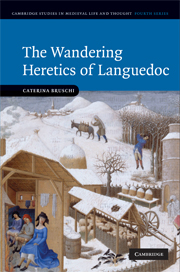
-
Select format
-
- Publisher:
- Cambridge University Press
- Publication date:
- July 2009
- May 2009
- ISBN:
- 9780511581564
- 9780521873598
- 9780521182270
- Dimensions:
- (228 x 152 mm)
- Weight & Pages:
- 0.51kg, 234 Pages
- Dimensions:
- (229 x 152 mm)
- Weight & Pages:
- 0.32kg, 234 Pages
You may already have access via personal or institutional login
Book description
How should historians read sources which record inquisitorial trials in the Middle Ages? How can we understand the fears felt by those on trial? By analysing six volumes of depositions in the trial of Cathar and Waldensian heretics in Languedoc between the late twelfth and the fourteenth century, in this book, Caterina Bruschi challenges old methodologies in the study of dissent. She examines the intrinsic narratological problems related to the sources and, using approaches from the social sciences, analyses the different fears felt by deponents and how those fears affected their actions and decisions. In so doing, she sheds light on itinerancy within the ecclesial structure of non-conformist movements and contextualises the problem of itinerancy as a benchmark for the definition of heresy. Focusing on the lives and attitudes of trial witnesses, this innovative account is a major contribution to our understanding of the nature of religious non-conformity in the Middle Ages.
Reviews
'Caterina Bruschi undertakes the seemingly quixotic task of attempting to recover the voices of Cathar heretics from amidst the historical and literary constructions of inquisitorial registers …ultimately, this portrayal of Catharism as a living, mobile, and nonconformist church rings true in the echoes of the individual voices that Bruschi has heard in her texts.'
Source: H-Net Reviews (www.h-net.org)
Contents
Metrics
Full text views
Full text views help Loading metrics...
Loading metrics...
* Views captured on Cambridge Core between #date#. This data will be updated every 24 hours.
Usage data cannot currently be displayed.
Accessibility standard: Unknown
Why this information is here
This section outlines the accessibility features of this content - including support for screen readers, full keyboard navigation and high-contrast display options. This may not be relevant for you.
Accessibility Information
Accessibility compliance for the PDF of this book is currently unknown and may be updated in the future.


